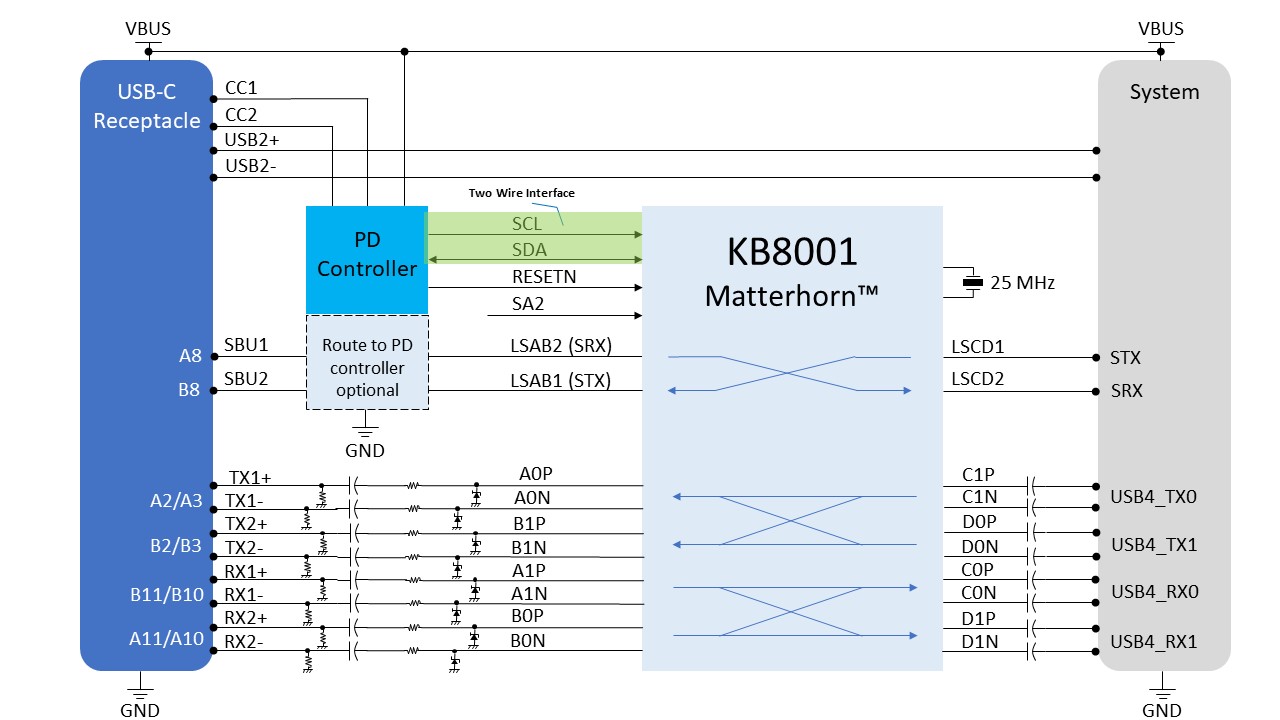In another departure from my chip design verification “beat,” I took a look at Kandou and like what I learned.
Kandou from Lausanne, Switzerland, boasts “Kandou It” as its tagline and as it should be if Kandou’s USB-C multi-protocol retimer solution with USB4 support is inside next-gen laptops, notebooks, desktops, tablets and workstations unveiled at CES 2022.

Its recent news touts availability of production silicon samples of KB8001, the first product from the Kandou Matterhorn family of USB-C multiprotocol retimer solutions with USB4 support. That follows an earlier announcement that Kandou was developing a retimer solution.
Kandou also claims the Matterhorn family is the only commercially available USB4 retimer to work across all SoC platforms. (Hint: The only other currently available USB4 retimer comes from a large company in Santa Clara, Calif.)
Retimers are becoming a bigger deal these days. USB-C is used now in most electronics devices and retimers will be needed for many of USB-C’s USB4 high-performance applications, including those with SSD drives.
That’s why consumers, especially tech-savvy readers of Semiwiki, should be delighted with Kandou’s news. Your next-gen desktop, laptop or tablet will support faster data transfer between USB4-connected devices and higher resolution displays with lower power consumption if Kandou is inside the system.
Reading the news release, I learned KB8001 follows the USB-IF specification for USB4 and supports long-reach with no compromise on signal integrity, giving engineers greater flexibility for chip placement in their system designs. Of note, the retimer solution can be located up to approximately 16 inches (or 40 centimeters) away from the main host SoC using low-cost PCB materials with no compromise on signal integrity. One retimer manages signal reconditioning and larger trace loads and offers flexible placement for larger laptops and desktops. Kandou’s “no regret” design delivers reduced overall system and development costs, eliminating the need for balancing the compromises that redrivers bring.
Matterhorn’s architecture enables support for various source and sink orientation options. It also supports multiple protocols: USB4 Gen2 and Gen3 signaling at 20 and 40Gbps; USB 3.2 Gen 1 and Gen 2 Super Speed signaling at 5 and 10 Gbps; DisplayPort 1.4a at 8.1, 5.4, 2.7 and 1.62 Gbps x1, x2, x4; Thunderbolt 2 and 3 at 20.625 and 10.3125 Gbps. Matterhorn complies with relevant standards and is interoperable with leading hosts and devices utilizing USB4, Thunderbolt, USB3.2 and DisplayPort functionality.
As I continued reading the news release, I learned BOM costs are lower due to the lack of external serial memory required for retimer parameters, integrated DC blocking capacitors, and integrated pull-up and pull-down resistors on low-speed wires. The Autonomous Rx Equalization (ARxE) dynamically corrects for extreme channel characteristics providing a hardware- and software-independent solution that goes beyond the current USB-IF standards. On-chip diagnostics including Eye Scope functionality support easy debug during development and end-of-line testing for assured product quality.
The KB8001 chip has been thoroughly tested to verify interoperability with leading hosts and devices utilizing USB4, Thunderbolt, USB3.2 and DisplayPort functionality.
Kandou got started in 2011 developing IP and now has an extensive IP portfolio that’s licensed and shipping in volume since 2019. More impressive is its 360 patents (and growing) related to unique and improved chip-to-chip signaling techniques. That IP success prompted Kandou to expand its business model to include fabless chip development, the first chip being the Matterhorn KB8001 retimer. Its expertise in high-performance, low-power SerDes design enabled Kandou to address stringent requirements of the USB4 standard. Oh yes, the total available market for USB4 retimers could exceed $1 billion.
Dr. Amin Shokrollahi is Kandou’s founder and CEO. His journey from genius math wizard to academic to semiconductor entrepreneur is a standalone blog post I’ll save for another time. I’ll leave you with a tantalizing tidbit about Amin: He studied the problem of transmitting data on electrical wires and solved it using mathematics, not our traditional electrical engineering solutions, knowing math could make the difference.
From my perspective, Kandou is a semiconductor company to watch because it “Kandou it.”
Visit the Kandou website to learn more.
Share this post via:





Moore’s Law Wiki